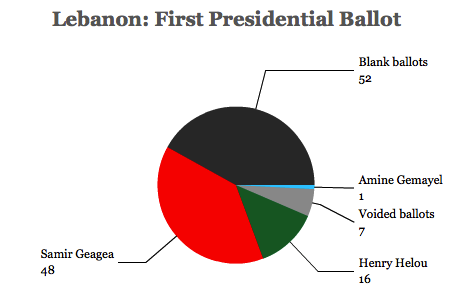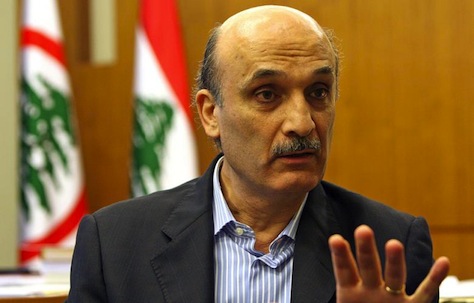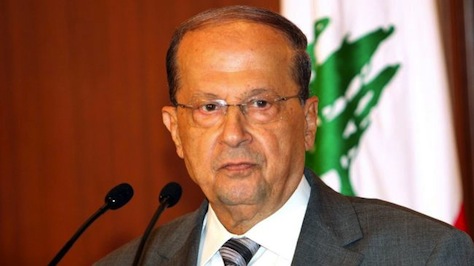As expected, none of Lebanon’s presidential candidates emerged today with the two-third majority required to succeed Michel Suleiman as the next Lebanese president.![]()
Suleiman’s term is scheduled to end on May 25, and Lebanon’s parliament today held the first of what is expected to be several ballots to choose a successor. Under Lebanon’s confessional system, its president has traditionally been a Maronite Christian.
The ‘March 8 bloc,’ which includes Hezbollah and Lebanon’s other Shiite parties, some Sunni Lebanese and the Free Patriotic Movement of Maronite leader Michel Aoun, all cast blank ballots.
The ‘March 14 bloc,’ which includes Saad Hariri’s Sunni Future Movement and Lebanon’s other Maronite parties, supported Samir Geagea, the leader of the Lebanon Forces.
Walid Jumblatt, who leads Lebanon’s political Druze community, supported Henry Helou.
As I wrote yesterday, the first round is largely seen as a testing ground for the strength of the various blocs. Starting with the next round, a candidate needs to win a simple majority (65) in order to win the presidency. If the blank votes correspond neatly to the March 8 coalition’s strength, it means that neither a March 8-backed Aoun candidacy nor a March 14-backed Geagea candidacy will win without appealing to Jumblatt and the Druze community. Aoun and Geagea, both controversial, are longtime rivals, dating back to the Lebanese civil war of the late 1970s and 1980s.
That means that it’s likely that a consensus candidate might emerge, possibly including army commander Jean Kahwagi, central bank president Riad Salameh, or former minister Ziad Baroud.
The presidential vote is the first major decision of the national unity government of prime minister Tammam Salam, which formed in February after ten months of tough negotiations. Lebanon’s next president will face strong pressures as Syria’s civil war enters its fourth year, with elevated tensions between Lebanese Sunni and Shiite constituencies, and with a deluge of Syria refugees challenging Lebanon’s infrastructural capacity.


 With the term of Lebanese president Michel Suleiman set to expire on May 25, the country’s 128-member parliament will convene tomorrow, April 23, for the first of what will likely be weeks of voting and negotiating to select a replacement.
With the term of Lebanese president Michel Suleiman set to expire on May 25, the country’s 128-member parliament will convene tomorrow, April 23, for the first of what will likely be weeks of voting and negotiating to select a replacement.